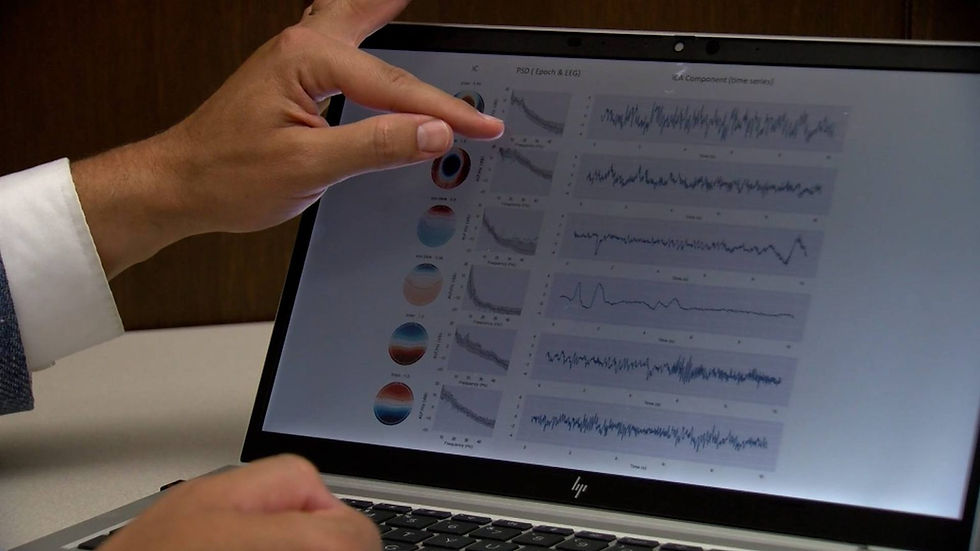Revolutionizing Mental Health: How AI-Powered Apps Are Transforming Stress, Anxiety, and Depression Treatment
- Covertly AI
- Mar 8, 2025
- 3 min read
The intersection of artificial intelligence and mental health is creating revolutionary changes in the way we approach stress, anxiety, and depression. As technology advances, AI is offering new ways to diagnose and treat mental health conditions, providing accessible and personalized solutions that were once out of reach for many. The rise of AI-driven applications is enabling more efficient and tailored care, making it easier for individuals to manage their mental well-being and get support when they need it most.
One of the most promising innovations is Anxolotl, an anxiety companion app designed to monitor and address stress in real-life situations. The app utilizes a supervised learning model for stress detection, boasting an impressive accuracy rate of 64.1%. This model monitors real-time data to assess a user’s emotional state, providing personalized stress management recommendations. Although there are challenges in perfecting the technology, such as dealing with individual differences in stress responses, Anxolotl demonstrates the growing potential of AI to play a significant role in mental health management. As AI continues to improve, the app is expected to become more accurate in predicting and alleviating anxiety, offering users an interactive, data-driven tool to manage their emotions effectively.

In addition to anxiety detection, AI is also transforming the treatment of depression. Rejoyn, a pioneering app for major depressive disorder, has gained approval from the U.S. Food and Drug Administration (FDA). This app focuses on neuroplasticity, using smartphone tasks to rewire neural signals and correct brain imbalances commonly associated with depression. Unlike traditional treatments, which often rely on medication or therapy, Rejoyn takes a more innovative approach by using everyday tasks to stimulate emotional circuits and promote healing. It encourages users to engage with emotional memory exercises that activate the amygdala and prefrontal cortex, aiming to balance the overactive emotional centers and strengthen memory and cognitive functions. Early clinical trials have shown promising results, suggesting that this app could be a powerful tool in complementing existing depression treatments, offering a non-invasive, app-based solution for users to manage their mental health.
Furthermore, AI’s potential to revolutionize mental health care extends to the realm of emotional support through digital therapy. A new AI ‘therapist’ has been developed that can sense users' emotions and learn how to better assist them in managing stress and emotional challenges. This AI-powered platform not only offers personalized advice but can also adapt to users’ emotional states over time, becoming more intuitive with each interaction. By analyzing tone, words, and behaviors, the AI is capable of providing tailored support that can be more responsive than traditional therapy. The idea is to create an emotionally intelligent AI companion that can guide users through stress management techniques and provide emotional support when they need it most. This AI therapist is also capable of producing personalized podcast content that mimics users' voices, offering emotional coaching and self-help resources in a format that feels personal and accessible.

The advent of AI-driven tools in mental health marks a transformative shift in how we address stress, anxiety, and depression. No longer confined to traditional therapy or medication, individuals now have access to innovative, personalized, and often more accessible treatment options. While these technologies promise to make mental health care more accessible and tailored to individual needs, they also raise important questions about the ethical considerations of using AI in such intimate contexts. Issues like privacy, data security, and the potential for AI to misinterpret emotional cues are critical factors that need to be addressed as these technologies continue to evolve.
As AI continues to advance, it’s clear that its role in mental health is poised to expand. Whether through real-time stress detection, innovative depression treatments, or emotional support apps, AI is providing new ways for individuals to manage their mental well-being. The future of mental health care may very well lie in the hands of AI, offering an accessible, scalable, and personalized approach to mental health that can revolutionize the industry. However, as with all emerging technologies, it's crucial to ensure that these tools are used responsibly, ethically, and with a deep understanding of their potential impact on users' lives.

The integration of AI into mental health care is not just about improving efficiency or reducing costs—it’s about providing users with more personalized, responsive, and effective tools for managing their mental health in a way that feels natural and intuitive. The future of AI in mental health looks incredibly promising, and with continued innovation, we can expect even more groundbreaking solutions to emerge in the coming years.
.png)







Comments